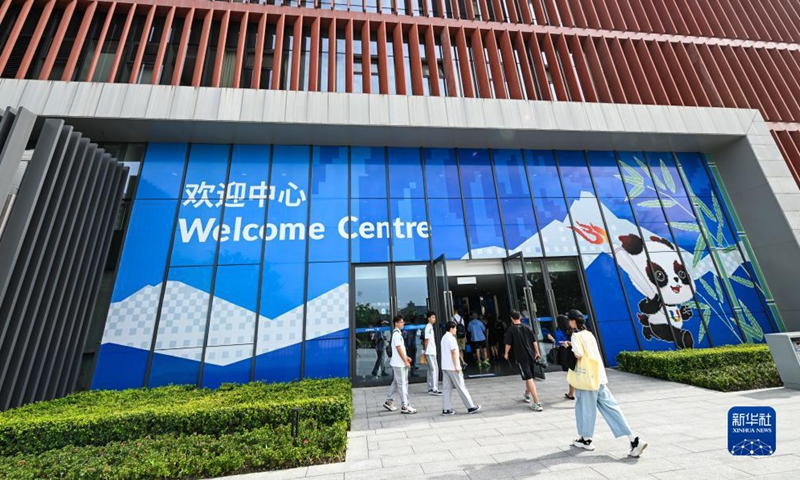
Chengdu 2021 FISU World University Games Village venues. Photo: Xinhua
In addition to the exciting competitions and athletic events, the green and low-carbon venue construction and logistic support for the Chengdu Universiade have also caught people's attention.
According to the City Work Service Department of the Chengdu FISU Games Executive Committee, preliminary calculations show that after having implemented comprehensive measures to reduce emissions, the Universiade will achieve a reduction of approximately 26,000 tons of carbon emissions.
In recent years, green and low-carbon concepts have become a consensus in the sports industry and are increasingly prominent in the organization of various large-scale sporting events in China.
As part of its efforts to actively promote the widespread use of low-carbon energy, the Chengdu Universiade has been using renewable energy in accordance with local conditions.
Among the 49 competition venues of the Universiade, 36 are existing buildings that have been renovated and upgraded, while 13 were newly built to meet international green building standards. For example, the Xiangcheng Sports Center has a rainwater collection system that can save more than 3,000 tons of water annually.
The Global Times learned from the Power Construction Corporation of China (Power China), which was responsible for building the Dong'an Lake Sports Park, the venue for the opening ceremony and main events of the Chengdu Universiade, that the park's design adheres to the concept of "respecting nature" and "adapting to local conditions."
The lake area, 12 kilometers in circumference, is divided into "ecological wetland tourist area," "ecological lakeside vitality area," and "ecological sports and leisure area," accommodating different urban functions. Power China has established a set of intelligent reservoir management systems based on water conditions to save on water costs.
In terms of green transportation, a total of 1,340 new-energy buses and over 1,000 new-energy cars are being used for transportation services during the Games. Among them more than 90 percent of the transportation from the FISU Games Village to the city center venues makes use of new-energy vehicles, and 100 percent of the transportation within the Village relies on new-energy shuttle buses.
In the Games Village, the furnishings of athlete apartments have been simplified. Ninety-five percent of the furniture is being leased for the event, so they will be used again in the future. In the village's restaurants, more than 70 percent of the contracted supplies are locally sourced seasonal vegetables. Furthermore, a facility capable of processing 10 tons of kitchen waste per day has been set up to promote resource utilization.
Recently, the Chengdu Universiade Low-Carbon Experience Hall became operational on the streets of Chengdu. By throwing mineral water bottles and cans into the "mouth" of a low-carbon cube, carbon credits can be generated, which can be exchanged for Universiade souvenirs.
High-tech experience installations have attracted the attention of many citizens. Staff members of the Chengdu Universiade Organizing Committee told the Global Times that the concept of a low-carbon and environmentally friendly Universiade is deeply rooted in people's minds and hearts.




